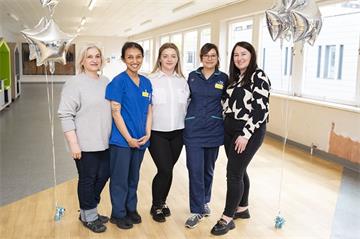Lead Plastic Surgeon performs limb operations in Ukraine

Sarah Tucker, Plastic Surgeon at Oxford University Hospitals (OUH), is part of an international medical team brought together by UK Med, a frontline medical aid charity, to provide limb care to patients who are affected by the war in Ukraine. They work with different groups such as the British Association of Plastic, Reconstructive, and Aesthetic Surgeons (BAPRAS) to provide an emergency response when needed. "I attended a webinar led by the coordinator of the plastic surgery response in BAPRAS, and that's where I received the invitation to be involved," Sarah said.
The emergency response was divided into two types: one was the immediate response to the conflict where people were needed to work at the frontlines; the other was to teach and train surgeons in a hospital which was remote from the frontline.
Sarah arrived in L'viv in November 2022 and stayed for two weeks. While she was there, she trained Ukrainian surgeons on reconstructive surgery, which was not part of their original skill set. There were challenges with getting proper equipment to use for surgeries because this was an unfamiliar area. This also exposed the fact that the specialised nurses who needed to monitor patients after these complex operations had been carried out did not exist in Ukraine. Their role is vital to ensure a good recovery for patients.
After Sarah's first trip to Ukraine, she came back to her base at the John Radcliffe Hospital and during a team away day told colleagues about the situation in Ukraine. Two nurses from the Specialist Surgery Inpatient Ward (SSIP), Mariagrazia Leotta and Pratima Gurung, a Clinical Practice Educator, decided to volunteer to help provide the training for the missing post operative care needed in Ukraine.
UK Med facilitated the next visit to Ukraine for the team from OUH and by April 2023 they were in L'viv working with the team on the ground to provide post operative care. The training was about plastic and muscle flaps, and how to take care of these after surgery.
Flap surgery involves the transfer of a living piece of tissue from one part of the body to another, along with the blood vessels that keep it alive. In some cases, the skin remains partially attached to the body, creating a flap, but in a free flap it is completely detached from its original site. It is therefore very susceptible to issues with the blood supply which can only now come through the reconnected blood vessels. The flap is then repositioned and stitched over the damaged area.
Due to the nature of the conflict in Ukraine, some of the patients are brought in with injuries which need plastic surgery intervention to save the limb and prevent the need for amputation. A flap failure increases the risk of the patient ending up with an amputation.
Prior to the additional training, flap surgeries had a 60 per cent survival rate. The pre and post operative care training to the Ukrainian healthcare professionals on how to manage patients increased the limb survival rates to around 95 per cent.
Communicating in Ukraine was supported by the excellent work of interpreters who helped overcome the language barriers.
The team in Ukraine are grateful for the help Sarah and her team continue to offer them as it's empowered them to do things they were unable to do before. They are now able to conduct successful complex operations without a visiting surgeon on ground, a feat they were unable to achieve before. A lot of patients also contact Sarah to share their gratitude, and she is in touch with the team to provide guidance and clarifications.
Anny Sykes, Interim Chief Medical Officer at Oxford University Hospitals, said: "I am very proud of the work Sarah, Mariagrazia and Pratima team have done to support Ukraine. They have demonstrated that compassionate and high-quality care is for everyone, and especially in difficult circumstances, people can receive the best care possible without any barriers."
Sarah Tucker, Consultant Plastic Surgeon at Oxford University Hospitals, said: "It is fantastic that the surgeons in Ukraine are now well trained in these complex operations, and they have started to do them without always needing to have a visiting surgeon present. This means there are now many patients who will benefit from the fact that we've trained the surgeons and given them the framework that they need for reconstructive surgery."
Pratima Gurung, Clinical Practice Educator, Specialist Surgical In-patient ward (SSIP), said: "The togetherness and devotion of the Ukrainians to each other gave me the motivation to be a better human being and nurse. Now that the health care professionals are trained on upper and lower limb plastic reconstruction surgery and its post-operative care, I hope it saves more limbs and families."
Mariagrazia Leotta, Clinical Practice Educator, Specialist Surgery In-Patient ward (SSIP), said: "It was a great experience, and I have met professionals from other countries and worked towards the same objectives as a team. I will never forget all that I’ve seen and the amazing people I’ve met as everyone taught me something - Keep fighting, even when it seems there is no hope left or nothing left to fight for. It is important to always do your best to help those in need without forgetting about yourself."
Pictured, from left to right: Dr Oksana Souter, Pratima Gurung, Viktoria Matsina, Mariagrazia Leotta and Lidia Holianska




























































